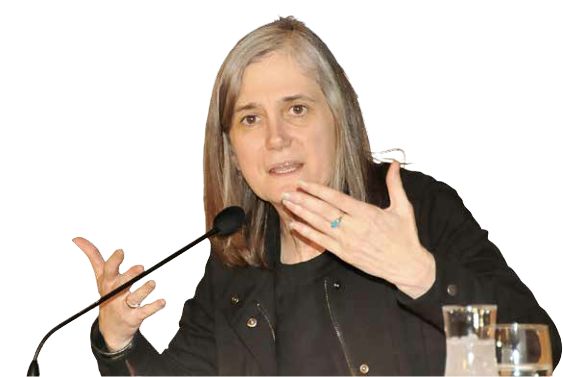Issue:
At the end of her Japan tour, the candid journalist stopped at the Club to speak her mind on media and independence
A my Goodman, founder of the independent news program “Democracy Now!” and the host of a significant amount of its output on radio, television and the internet, has a reputation for being outspoken. She lived up to that reputation by declining to pull her punches on subjects far and wide at a luncheon at the FCCJ on Jan. 20.
Visiting Japan to do a series of live broadcasts, including looking at the U.S. military presence in Okinawa and the fate of evacuees from towns close to the Fukushima nuclear plant, Goodman also visited Hiroshima and spoke at universities in Tokyo and Kyoto.
A vocal critic of the mainstream media in the rest of the world, she was equally unimpressed by the performance of the Japanese media in covering issues that should be of critical importance to a domestic audience. “We met with anti-nuclear protestors outside the prime minister’s residence and those who oppose nuclear power are in the majority here, but I don’t see that being reported on the nightly news,” she said.
“The media should be a great force that levels the playing field, not a megaphone for those in power,” she said. “It should be apart from politics, not a part of them.
“The media should be the checks and balances on power, an essential function of a democratic society.”
Born in Washington DC in 1957, Goodman joined Pacifica Radio station WBAI in New York City. Founded in 1949 by a conscientious objector who believed other radio stations were run by corporations “that have nothing to tell and everything to sell,” one of Pacifica Radio’s most proud achievements was setting up a station in the deeply conservative oil city of Houston.
The fact that the local Ku Klux Klan blew the station’s transmitter up twice demonstrated the fear that free speech engenders, Goodman said.
“Democracy Now!” was set up in 1996 to serve as a force for peace and to give an alternative view to the “small number of pundits who know so little but say so much in our media.”
Goodman expressed a particular disdain for journalists being “embedded” with troops operating in places such as Iraq or Afghanistan. “I think the embedding process has brought the media to an all-time low,” she said. “I’m not saying those reporters are not brave, but what do you get from that perspective? We need reporting from the target end,” she said.
And that is not impossible, she pointed out, as Australian journalist Wilfred Burchett demonstrated as long ago as 1945. With Western media banned from travelling to Hiroshima to report on the aftermath of the world’s first atomic bomb attack, Burchett circumnavigated General Douglas MacArthur’s edict to get into the city.
He saw the shadows of people stained into walls and pavements by the detonation of the bomb, survivors horribly burned and others with their hair falling out. Nobody knew it at the time, but the people of Hiroshima were falling victim to radiation sickness. Burchett sat down in the rubble of the city and typed a dispatch in which he described the “atomic plague” and the devastation wrought on Hiroshima as a “warning to the world.”
Burchett managed to evade the censors and the story shocked the world when it appeared in The Daily Express.
In retaliation, Gen. MacArthur ordered that Burchett be expelled from Japan. His camera mysteriously disappeared and his reporting was dismissed by U.S. authorities. In response, the New York Times science reporter William Laurence was among a group of journalists invited to the U.S. military’s nuclear proving grounds in New Mexico and subsequently wrote a series of articles refuting Burchett’s experiences.
Awarded a Pulitzer Prize for his coverage, it later emerged that Laurence was simultaneously on the payroll of the War Department and wrote press releases and statements defending America’s atomic program.
Goodman has written to the organizers of the Pulitzer Prize to demand that Laurence be stripped of his award. “It is critical that we be independent of the state,” she said, but admits the problem continues to this day. More recently, Goodman said, the media failed the public “miserably” before and during the Iraq war.
Six weeks before the fighting broke out, Noam Chomsky said the U.S. media was “manufacturing consent” for the war, when just two weeks before the first shot was fired, the four main television channels in the U.S. aired 393 interviews about the war. Of that total, Goodman points out, a mere three were with people opposed to the conflict. “That is no longer a mainstream media,” she said. “It’s an extremist media beating the drum for war.”
The author of five books on the relationship between the media, government and big corporations, including Static and, most recently, The Silenced Majority, Goodman says the world needs a free and fair media. “We need a media that covers power, not covers for the powers,” she said. “A media that covers the state, not covers for the state. That is the kind of media that will save us.”

Julian Ryall is the Japan correspondent for The Daily Telegraph.

